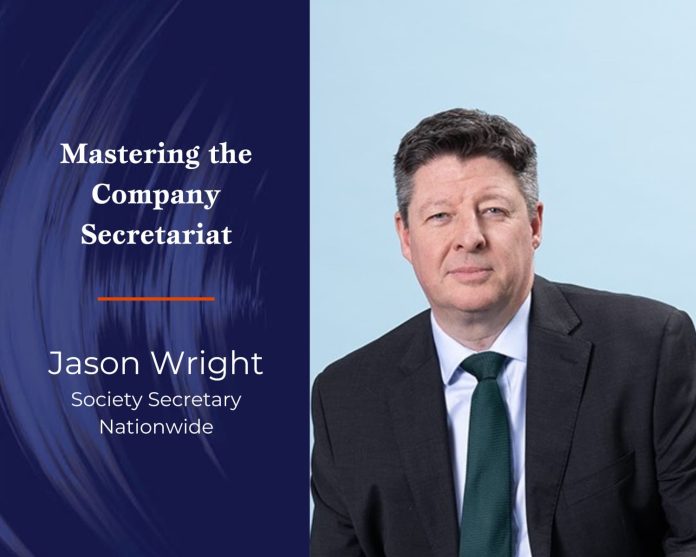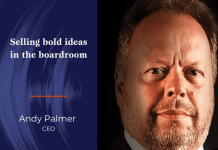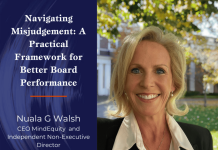The podcast and the article are brought to you by The Better Boards Podcast Series.
Managing an ever-growing agenda, Company Secretaries today face a plethora of issues that can pull their focus in countless directions. It’s truly challenging to work effectively with the board and keep on top of the ever-changing economic, technological, and regulatory landscape. So, how can Company Secretaries maintain clarity and focus amidst their expanding responsibilities?
In this podcast, Dr. Sabine Dembkowski, Founder and Managing Partner of Better Boards, discusses mastering the company secretariat with Jason Wright, Society Secretary at Nationwide. Appointed in March 2021, with over 25 years’ experience in banking and financial services, Jason has previously worked for Royal Bank of Canada, Santander, and Barclays. As a Company Secretary, Jason has supported Chairs with board succession, board skills assessments, board composition, and building and running high-performing secretariat teams. He considers his primary role to be supporting the board and ensuring his directors have the best quality information and environment to make the best decisions.
“If you do the small things perfectly, you’ll be trusted to do the big things”
Jason, a self-proclaimed perfectionist, believes in the power of attention to detail. He likes to have plenty of reassurance that anything he or his team is responsible for will be done “just so” and delivered as expected. To prevent surprises, especially around board meeting days, annual events, and the annual reporting, he carefully monitors moving parts and what’s going on with various projects, checking and re-checking. This meticulous approach helps him feel on top of things, and crosschecking to ensure he’s prepared helps build trust in his position. Jason believes getting the small stuff right wins trust for involvement in bigger tasks.
“You have to give the impression of being the calm, serene swan on the river paddling upstream. But actually, below the surface, your legs are going like crazy, just to stay still sometimes”
The sheer volume of materials and regulations that board secretaries manage is incredible and growing more extensive and complex. Jason likes to look ahead at the next year as he’s planning to help manage agendas for each board session and event. He tries to get ahead of where there’s a time constraint or pending conflicts between committee schedules or support needs. While financial services groups like his face abundant complexity, he knows other company secretaries face the same challenges.
Every board cycle, Jason realises there will be a challenge in giving each board member, committee, and stakeholder the time they want. His role in enabling board effectiveness is to gently coach and influence executives around what non-executive directors expect regarding paper length, detail, clarity, and presentation time. He also evaluates incoming items in terms of what the board needs to approve, strictly speaking, as opposed to what the board might like time to discuss and build awareness about without needing to make a motion. He notes that building good relationships with each board member helps immensely with finding this balance.
“It’s a lot, a lot of preparation”
Jason is keen for his team to sit down and discuss the agendas for each board cycle. They look for items appearing in multiple committees or multiple meeting plans to remove duplication and place things in the most effective spot for resolution. He also looks at the structure of the agenda. His current Chair wants each board meeting to have a strategic, operational, and socially minded agenda item, which gives Jason a structure and framework to work around as he builds agendas.
Papers are another issue that is being addressed in preparation. They have historically been good but lengthy. Now, Jason is using a new tool, Lucia, which uses question-derived insights to help frame papers. He feels it has helped with both length and setting expectations for the board about what will be discussed or decided, with positive feedback on the implementation over the last few board cycles.
“You need to understand the Directors, to help the Chairman help them bring the best of themselves to the meetings”
To help his board work effectively, Jason makes himself available during board cycles. He makes a point of connecting with each Director, checking on their needs, seeking feedback, and listening. This creates a positive relationship and gives him a better sense of what each Director likes, dislikes, prefers and needs for the meetings.
In meetings, Jason sits next to his Chairman, helping flex the agenda as it flows to allow for extended discussions, things resolving more quickly, or other day-of changes. He keeps team members outside the meeting to help welcome and manage board guests. As meetings wrap up, he has agenda-free dinners arranged so board members can deepen their connections to each other, which also helps with the board’s ongoing strong functioning.
“What you have to do, first of all, is prove to them that you’ve got something to add”
Jason has worked to achieve his relationships and influence by showing that he could make a positive difference in the board’s effectiveness and accomplishments. He actively looks for places where he can anticipate a need or remove a burdensome task for a Director or his Chairman. For example, when he was first at Nationwide, he helped his previous Chairman move succession planning from something kept personally by the Chairman to an official, written board succession plan suitable for use with regulators. This project showed that Jason was a value-add, and from there, he continues to be included in more tasks and with more planning. Now, he leans on his team for day-to-day practicalities and focuses more on thinking and planning aspects of the Secretary’s role.
The three top takeaways for effective boards are:
- It’s essential that you enjoy the role. It’s a privilege to be at the table where the big calls get made, so you need to enjoy it.
- You need to know your place. You’re there to serve and support the board. Focus on that with laser vision, and you can’t really go wrong.
- Nail the smaller details, and then you’ll be invited to have fun doing the big stuff.
Don’t forget to subscribe never to miss an episode of the Better Boards Podcast Series. Available on their website, Apple, Spotify or Google.
To find out how you can participate in the Better Boards Podcast Series or more information on Better Boards’ solutions, please email us at info@better-boards.com.




































